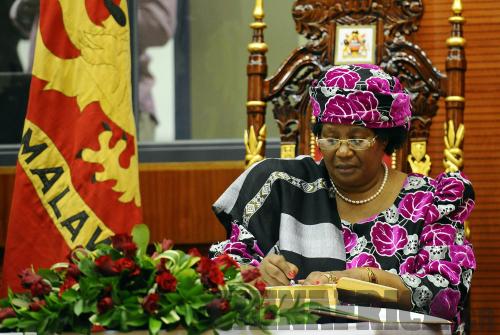|
|

|
|
HISTORIC: Malawi's first female president Joyce Banda |
In just two years Malawi had turned into a full-blown dictatorship despite a democratic constitution. Malawi had also turned into an economic basket case without adequate forex and worse still had insulted its donors and investors, sending some back to their respective countries. All this happened under the rule of President Bingu wa Mutharika who passed away on April 5, 2012 at the age of 78.
The demise of Mutharika ushered in the appointment of a new president, Joyce Banda, who under the Malawi Constitution was automatically sworn in by virtue that she was the vice president of the country at the time of Mutharika's death. Banda is only Africa's second female president.
The legacy of Mutharika will be a difficult challenge for Banda to resolve and she has only two years in which to right the helm of state and set its sails in the right direction before she faces voters in May 2014.
Renowned Malawi commentator Tom Likambale said that President Banda will need all her experience and skill as a former Minister of Foreign Affairs and International Cooperation to re-establish diplomatic relations with Great Britain, the United States, the World Bank, the International Monetary Fund, the United Nations and the European Union, to regain financial and other assistance.
This is a process Banda has already started. She told reporters just days after her appointment that she had asked U.S. Secretary of State Hillary Clinton to unfreeze aid to Malawi that came through the U.S. Millennium Challenge Corporation.
Banda also said she was in a bid to improve relations with Britain, which withdrew its envoy to Malawi during a diplomatic dispute with Mutharika, and as well as donors like the European Union and International Monetary Fund.
The late Mutharika famously told the IMF that "If donors are going to criticize that, [devaluation] saying this is not democracy, to hell with you… If any donor wants to withdraw from this country, let them leave and go."
Mutharika somehow found it fit to expel the British High Commissioner on flimsy, egocentric grounds and heaped vituperation on the UK, which, in response, expelled Malawi's High Commissioner in London with disastrous consequences. The British withdrew direct budgetary support to Malawi and restricted their aid to agencies and NGOs.
Likambale said that in the short term, Banda might have to devalue the local Kwacha against other currencies, one of the preconditions for getting back on track with the IMF.
The prospects look good as the United States already indicated that it looks forward to continued partnership with the government and people of Malawi.
State Department spokeswoman Victoria Nuland urged the new president to follow the "importance of adhering to rule of law, and to working across parties as the government of Malawi moves forward."
In as much as Banda will try to work with current cabinet members, it will not be an easy task. This is because in the first place members of the Democratic Progressive Party, whose leader was the late Mutharika, delayed the announcement of his death, as there was a backroom power struggle over the transition with plans to install the late president's brother Peter Mutharika as president.
In a major clean-up Banda has already fired Inspector General of Police Peter Mukhito, Secretary of Treasury Joseph Mwanamvekha and former Minister of Information and Civic Education Patricia Kaliati. Other officials have been moved to different departments, like former Principal Secretary in the Office of the President and Cabinet Dr. Mary Shawa who is at the Ministry of Gender. The clean-up exercise is expected to continue after Mutharika's burial.
One of the most disturbing aspects of President Banda's otherwise magnificent swearing-in ceremony on April 7, 2012 was the spectrum of Mutharika-era cabinet ministers and his DPP MPs publicly cheering, almost falling over themselves, to demonstrate their loyalty to the new president. As much as this was a hopeful sign of unity, many of the same individuals had spent the last three years publicly heaping scorn upon Banda following her fall-out with Mutharika in 2009 and the formation of her own political party, the People's Party.
(Reporting from Malawi) |